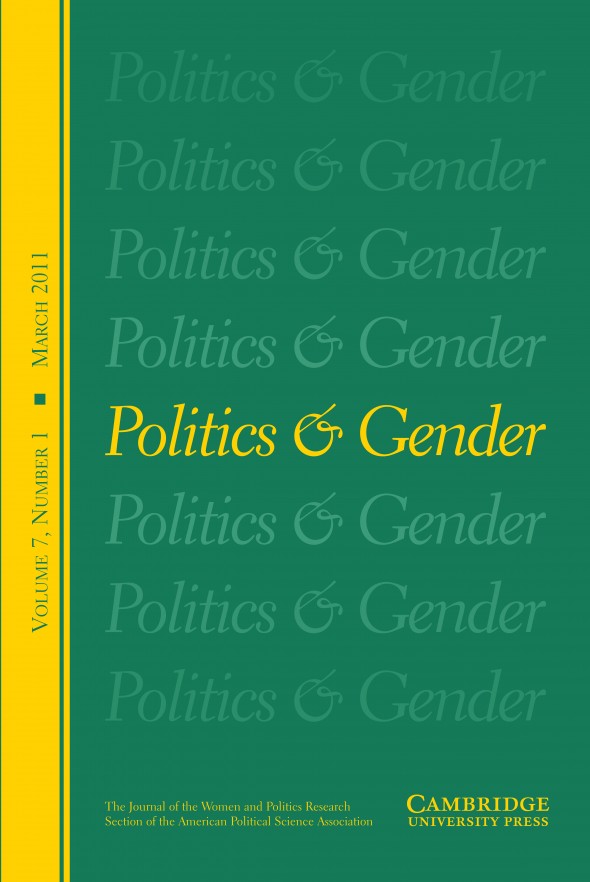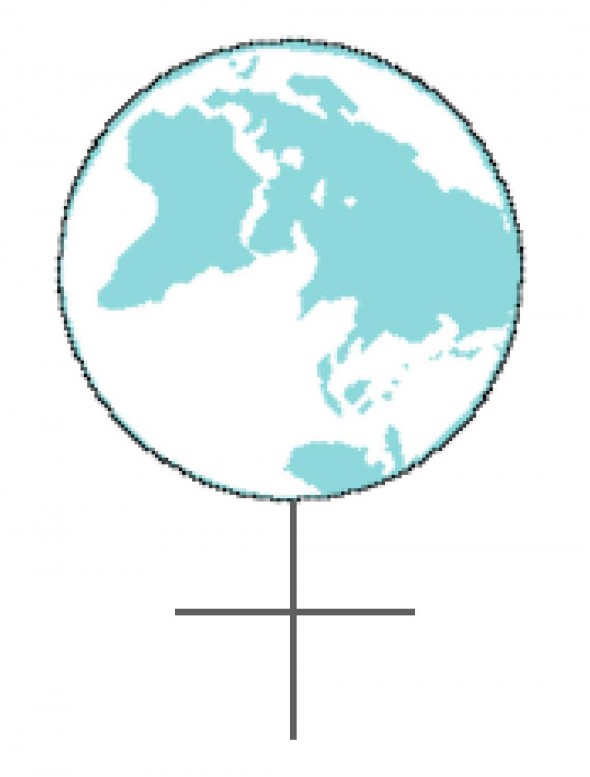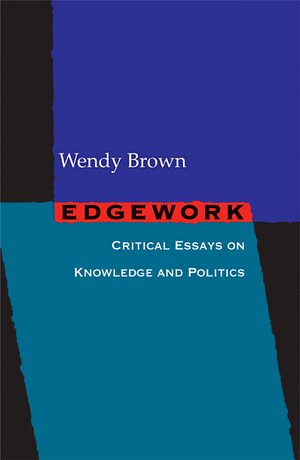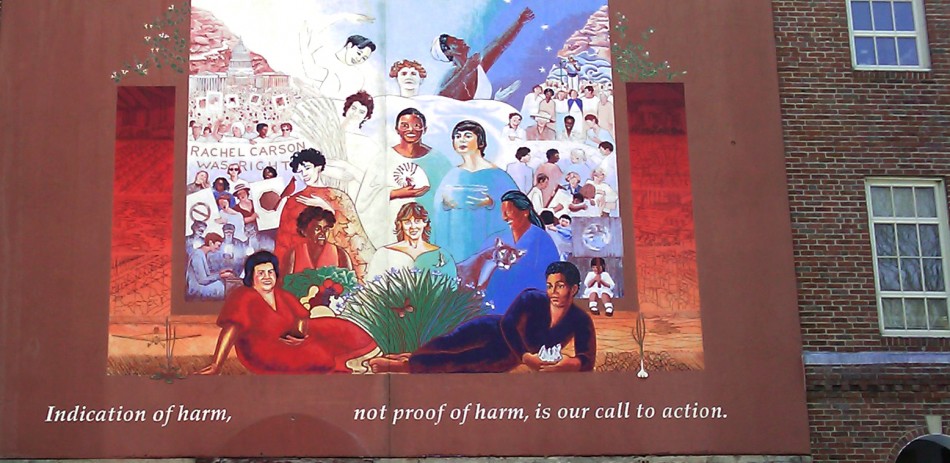Passersby who look up at the mural will not understand all of the symbolism immediately-and that is just the way the artist planned it. “I want people to take from it whatever they do,” said Sargent. “Each time they look at it, they will see something new.” She added, “I’m trying to get to all women with this mural and the only way you get to all women is slowly.”
Sargent said she decided to approach the Women’s Community Cancer Project (WCCP) with the idea of painting a mural for the project, when one more friend of hers was diagnosed with cancer. She wanted to create a work of art that would draw attention to cancer’s murderous toll on women-not as a picture of doom and gloom, but as a celebration of movers and shakers for political and social justice, both those living and those killed by cancer (find the article –here-).
Please look forward to a Critical Perspectives section on intersectionality for Politics & Gender edited by Professors Ackerly and Rose McDermott (Brown University)
–Readings in Feminism–
Sharon Krause, "Contested Questions, Current Trajectories: Feminism in Political Theory Today" (Politics & Gender, 2011) | [See the full article -here-] I once mentioned to a prominent feminist scholar that I was using one of her books in my course on feminism and political theory. She looked at me blankly for a moment and then replied, “Feminism and political theory? I thought feminism is political theory.” She was right of course; in some sense, everything that is feminist theory is also political theory. Feminism illuminates gendered relations of power in politics and social life, after all, and it contributes (however indirectly) to the larger project of transforming them. Moreover, since the rise of “second wave” feminism in the 1970s, feminist theorists have significantly reshaped political theory as a discipline, moving crucial questions from the margins of the field to its center, questions about gender equity and justice, the constitution of the political subject, the demands of difference, the intersecting dynamics of domination, the differential effects of globalization, and the conditions of freedom, among other things. As a result, much of what we think of as “mainstream” political theory is now also feminist theory. This is often true even of work that does not make women or gender its sole subject matter, as the leading voices in the field increasingly are scholars whose work has been shaped by literatures central to feminism and who think about politics in ways that are informed by a critical consciousness of the gendered quality of power relations. |
Ann Towns, "The Status of Women as a Standard of 'Civilization'" (European Journal of International Relations, 2009); Winner of the Okin-Young Award | [See the full article -here-] "This article focuses on the status of women as a standard of civilization by examining its emergence in the 19th-century European ‘society of civilized states.’ More specifically, the article centers on expectations about the proper political role of women and how these operated as a standard to distinguish ‘civilized’ states from other societies. The article shows that the political exclusion of women — not their inclusion — became expected behavior for ‘advanced’ societies at this time. To statesmen and social scientists alike, evidence from ‘savage’ society and an uncivilized European past demonstrated that women could not contribute to human advancement if given a political role. To arrive at this claim, the article examines the understandings that had come into place to make the political exclusion of women possible and reasonable for European and European settler states." |
“Global Feminisms: Theory and Ethics for Studying Gendered Injustice” – by Brooke Ackerly and Katy Attanasi (New Political Science, 2009) | [See the full article -here-] Abstract: Global justice needs a form of feminism that holds in relation various strands of feminism. Others have selected from feminisms around the globe a version of feminism to name and criticize as “global.” In this essay we identify within feminist struggle for justice around the world global feminisms that take those ideas that others may hold in critical tension—tension which suggests dichotomous interpretations of injustice or opposites on the static scales of justice (such as concerns with recognition versus redistribution)—and hold them instead in dynamic relationship. Global feminists hold in relation the academic post-modern feminists’ concern with “hegemonic meta-narratives” and the women’s rights activists’ attempts to get global recognition of the violations of women’s rights. Global feminists are concerned about the ways in which research is done and the uses to which it is put. Global feminists hold in relation the idea that contexts matter and the idea that the most powerful forces of injustice are embedded in the normative structures of those contexts everyday. In sum, this article looks at global feminisms as a theoretical trend, an ethical approach to research, and an ontological perspective on the relationship between global and local, social, political, and economic values, practices, and norms. Global feminism is a paradoxical posture toward the world that eschews imperialist definitions. It is at once always aware of global connectedness as well as cognizant of the concern that global connectedness can create opportunities for neo-colonial globalism. |
Leslie McCall, “The Complexity of Intersectionality” (Signs, 2005) | [See the full article -here- and reprinted in Intersectionality and Beyond: law, power, and the politics of location -here-] "Since critics first alleged that feminism claimed to speak universally for all women, feminist researchers have been acutely aware of the limitations of gender as a single analytic category. In fact, feminists are perhaps alone in the academy in the extent to which they have embraced intersectionality-the relationships among multiple dimensions and modalities of social relations and subject formations-as itself a central category of analysis. One could even say that intersectionality is the most important theoretical contribution that women's studies, in conjunction with related fields, has made so far. Yet despite the emergence of intersectionality as a major paradigm of research in women's studies and elsewhere, there has been little discussion of how to study intersectionality, that is, of its methodologies..." |
Wendy Brown, Edgework: Critical Essays on Knowledge and Politics (Princeton University Press, 2005) | [See the book at Princeton University Press -here-] Chapter 7: The Impossibility of Women's Studies "There is today enough retrospective analysis and harangue concerning the field of women’s studies to raise the question of whether dusk on its epoch has arrived, even if nothing approaching Minerva’s wisdom has yet emerged... I want to consider a problem to one side of these questions that might also shed light on them. To what extent is women’s studies still tenable as an institutionalized domain of academic study, as a circumscribed intellectual endeavor appropriate as a basis for undergraduate or graduate degrees?" |
“Current Controversies in Feminist Theory” – Mary Dietz (Annual Review of Political Science, 2003) | [See the full article -here-] Abstract: Over the past two decades, academic feminism has differentiated and fragmented substantially in light of a wide range of new approaches in theory. This overview and assessment of the wide, diverse, and changing field of feminist theory gives particular attention to contestations surrounding the political theorizing of gender, identity, and subjectivity. Three divergent and oppositional perspectives—difference feminism, diversity feminism, and deconstruction feminism—frame current discussions regarding the “construction” of the female subject; the nature of sexual difference; the relation between sex and gender; the intersection of gender, race, class, sexuality, etc.; and the significance of “women” as a political category in feminism. The problem of epistemic identification (locating or dislocating the female subject, analyzing gender difference, politicizing identity) is also a central element in the theorizing of feminist politics, multicultural citizenship, justice, power, and the democratic public sphere. Within this domain, we find equally intense debates among feminist theorists concerning the meaning of feminist citizenship and the politics of recognition, as well as the relations between gender equality and cultural rights, feminism and multiculturalism, democracy and difference. Although the field is far from convergence even on the meaning of feminism itself, we might take its current state as a sign of its vitality and significance within the discourses of contemporary social and political theory. |
–Feminism on the Web–
 | The Association for Women's Rights in Development (AWID) has a newsreel on women's rights in the news. See also the "Young Feminist Wire," published by AWID which includes news, activist resources, and articles. See particularly, an article on "enlightened sexism" and their "Significant Moments for Women's Rights in 2011." Visit the website of Sister Song, an Atlanta-based organization for leadership on a US rights-based approach to activism for women’s health. Gender Across Borders is a global feminist community and blog with articles on gender and cultural relativism, queer politics, race and ethnicity. |
